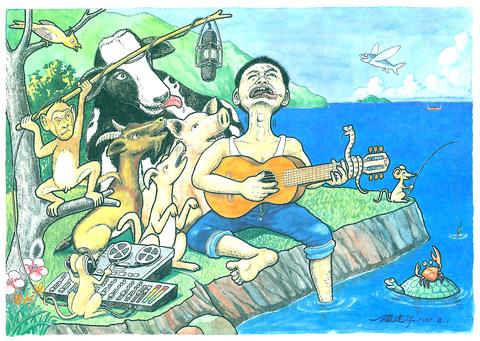Chen Chian-nian (
Since then, the story of Pur Dur, Chen's Aboriginal name, the musician, police officer and nature lover who lived quietly in the Taitung hills began to emerge in the media.
Instead of quickly churning out more albums on the strength of his sudden fame, the usual practice in Taiwan's pop music scene, Chen chose to avoid the media spotlight altogether by applying for a transfer to Orchid Island. There, Chen resumed his quiet lifestyle made up of police duty, fishing, diving and music making.

PHOTO COURTESY OF TCM
Except for occasional tour groups visiting him and asking for his autograph, Chen's life was largely undisturbed on the island.
Mother Earth (大地), released two months ago, is the result of Chen's three years as a recluse on the island.
Love of Earth, which Chen wrote with his fans in mind, is the track that best illustrates the change in his life since his first album.
"My decision to transfer to Orchid Island was quite a shock for people around me, but that was the step I had to take for myself and my creative career ? People often talk about getting closer to nature but few can do so. Here I can enjoy solitude in the midst of nature. How lucky I am. Maybe there are fascinating things in cities too, but I believe life in nature suits me best," Chen said.
Other tracks document aspects of his daily life. Balaba is a musical portrait of the city life Chen experienced when he was in Taipei preparing his first album. You Are Heaven (for my Wife and Children) is a collaboration with a friend, who was about to become a father at the time the album was being prepared, as indeed Chen was. Their genuine affection for their families is evident in the song.
In Mother Earth, fans will find Chen has matured as a musician. Repelled by the idea of "singing into a machine," Chen was not comfortable recording in a studio. The past two years has changed that. Not only has Chen become more at ease with recording studios, he also demands higher recording quality.
Experimenting with different musical genres, Chen fused cool jazz, bossa nova and blues into his characteristic folk style. The sounds of nature accompanying the music on the album were recorded on Orchid Island. You can hear the sound of shepherds' piping, the roar of bulls and the sounds of children's laughter in this visually rich album.
Overall, the tone is very mellow, with lots of New Age touches, but Chen manages to defy too-easy pigeon-holing.
To present a more authentic Aboriginal flavor, Chen made a vibraphone out of bamboo gathered in the mountains of Taitung. The sound of this handmade instrument can be heard on the track The Heart of Taitung is an Orchid which is dedicated to his hometown.
Chen Chian-nian will perform at 10pm at Witch's House today. Tickets are NT$250 at the door. For more information, call Witch's at (02) 23625494.

One of the biggest sore spots in Taiwan’s historical friendship with the US came in 1979 when US president Jimmy Carter broke off formal diplomatic relations with Taiwan’s Republic of China (ROC) government so that the US could establish relations with the People’s Republic of China (PRC). Taiwan’s derecognition came purely at China’s insistence, and the US took the deal. Retired American diplomat John Tkacik, who for almost decade surrounding that schism, from 1974 to 1982, worked in embassies in Taipei and Beijing and at the Taiwan Desk in Washington DC, recently argued in the Taipei Times that “President Carter’s derecognition

This year will go down in the history books. Taiwan faces enormous turmoil and uncertainty in the coming months. Which political parties are in a good position to handle big changes? All of the main parties are beset with challenges. Taking stock, this column examined the Taiwan People’s Party (TPP) (“Huang Kuo-chang’s choking the life out of the TPP,” May 28, page 12), the Democratic Progressive Party (DPP) (“Challenges amid choppy waters for the DPP,” June 14, page 12) and the Chinese Nationalist Party (KMT) (“KMT struggles to seize opportunities as ‘interesting times’ loom,” June 20, page 11). Times like these can

JUNE 30 to JULY 6 After being routed by the Japanese in the bloody battle of Baguashan (八卦山), Hsu Hsiang (徐驤) and a handful of surviving Hakka fighters sped toward Tainan. There, he would meet with Liu Yung-fu (劉永福), leader of the Black Flag Army who had assumed control of the resisting Republic of Formosa after its president and vice-president fled to China. Hsu, who had been fighting non-stop for over two months from Taoyuan to Changhua, was reportedly injured and exhausted. As the story goes, Liu advised that Hsu take shelter in China to recover and regroup, but Hsu steadfastly

You can tell a lot about a generation from the contents of their cool box: nowadays the barbecue ice bucket is likely to be filled with hard seltzers, non-alcoholic beers and fluorescent BuzzBallz — a particular favorite among Gen Z. Two decades ago, it was WKD, Bacardi Breezers and the odd Smirnoff Ice bobbing in a puddle of melted ice. And while nostalgia may have brought back some alcopops, the new wave of ready-to-drink (RTD) options look and taste noticeably different. It is not just the drinks that have changed, but drinking habits too, driven in part by more health-conscious consumers and